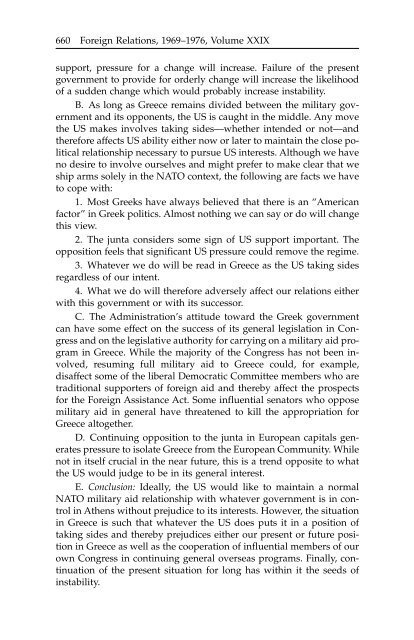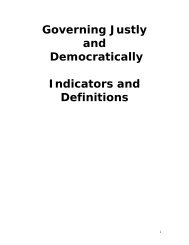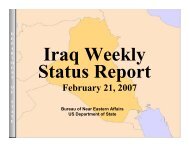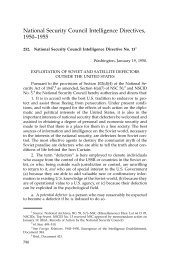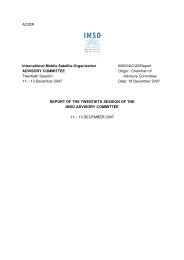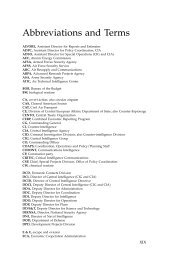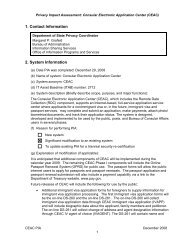Greece - US Department of State
Greece - US Department of State
Greece - US Department of State
You also want an ePaper? Increase the reach of your titles
YUMPU automatically turns print PDFs into web optimized ePapers that Google loves.
660 Foreign Relations, 1969–1976, Volume XXIX<br />
support, pressure for a change will increase. Failure <strong>of</strong> the present<br />
government to provide for orderly change will increase the likelihood<br />
<strong>of</strong> a sudden change which would probably increase instability.<br />
B. As long as <strong>Greece</strong> remains divided between the military government<br />
and its opponents, the <strong>US</strong> is caught in the middle. Any move<br />
the <strong>US</strong> makes involves taking sides—whether intended or not—and<br />
therefore affects <strong>US</strong> ability either now or later to maintain the close political<br />
relationship necessary to pursue <strong>US</strong> interests. Although we have<br />
no desire to involve ourselves and might prefer to make clear that we<br />
ship arms solely in the NATO context, the following are facts we have<br />
to cope with:<br />
1. Most Greeks have always believed that there is an “American<br />
factor” in Greek politics. Almost nothing we can say or do will change<br />
this view.<br />
2. The junta considers some sign <strong>of</strong> <strong>US</strong> support important. The<br />
opposition feels that significant <strong>US</strong> pressure could remove the regime.<br />
3. Whatever we do will be read in <strong>Greece</strong> as the <strong>US</strong> taking sides<br />
regardless <strong>of</strong> our intent.<br />
4. What we do will therefore adversely affect our relations either<br />
with this government or with its successor.<br />
C. The Administration’s attitude toward the Greek government<br />
can have some effect on the success <strong>of</strong> its general legislation in Congress<br />
and on the legislative authority for carrying on a military aid program<br />
in <strong>Greece</strong>. While the majority <strong>of</strong> the Congress has not been involved,<br />
resuming full military aid to <strong>Greece</strong> could, for example,<br />
disaffect some <strong>of</strong> the liberal Democratic Committee members who are<br />
traditional supporters <strong>of</strong> foreign aid and thereby affect the prospects<br />
for the Foreign Assistance Act. Some influential senators who oppose<br />
military aid in general have threatened to kill the appropriation for<br />
<strong>Greece</strong> altogether.<br />
D. Continuing opposition to the junta in European capitals generates<br />
pressure to isolate <strong>Greece</strong> from the European Community. While<br />
not in itself crucial in the near future, this is a trend opposite to what<br />
the <strong>US</strong> would judge to be in its general interest.<br />
E. Conclusion: Ideally, the <strong>US</strong> would like to maintain a normal<br />
NATO military aid relationship with whatever government is in control<br />
in Athens without prejudice to its interests. However, the situation<br />
in <strong>Greece</strong> is such that whatever the <strong>US</strong> does puts it in a position <strong>of</strong><br />
taking sides and thereby prejudices either our present or future position<br />
in <strong>Greece</strong> as well as the cooperation <strong>of</strong> influential members <strong>of</strong> our<br />
own Congress in continuing general overseas programs. Finally, continuation<br />
<strong>of</strong> the present situation for long has within it the seeds <strong>of</strong><br />
instability.


